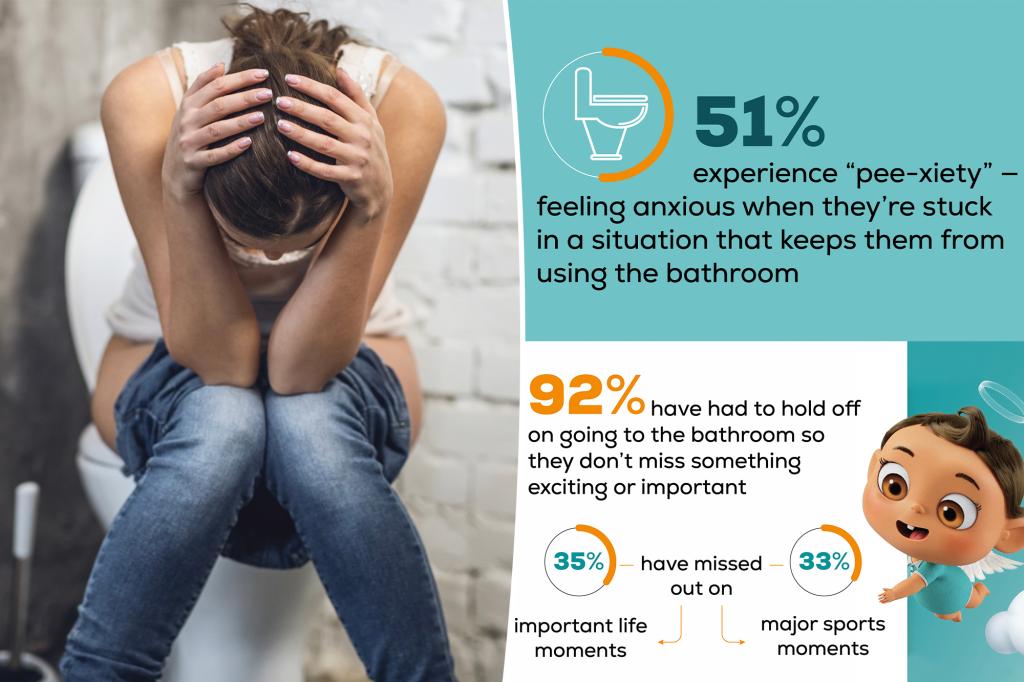Bathroom Anxiety: A Widespread Phenomenon Affecting Americans
A recent survey of 2,000 U.S. adults reveals that bathroom anxiety, or "pee-xiety," is a surprisingly common experience. Defined as the anxiety stemming from being trapped in a situation without bathroom access, pee-xiety affects 51% of Americans. This anxiety often leads to people delaying bathroom breaks, with a staggering 92% admitting to holding it in to avoid missing out on something they deem important or exciting. A quarter of respondents confessed to frequently postponing bathroom breaks, highlighting the extent to which this anxiety dictates their behavior. This widespread phenomenon impacts various aspects of life, from missing cherished personal moments to crucial sporting events, and underscores the need for greater awareness and strategies to manage bathroom anxiety.
The consequences of this bathroom avoidance can be significant. Thirty-five percent of respondents revealed they’ve missed important life events due to urgent bathroom needs. Examples ranged from witnessing a child’s first steps to experiencing the finale of a major concert, illustrating the emotional cost of this anxiety. Furthermore, a third of those surveyed missed pivotal sports moments, including game-winning plays and even their own children’s sporting achievements, due to bathroom breaks. This highlights the far-reaching impact of bathroom anxiety, affecting not only personal lives but also shared experiences and memories.
The survey further identified specific situations that trigger bathroom anxiety. Topping the list were being stuck in traffic (40%), enduring long car rides (34%), waiting in lines (34%), experiencing intimate moments (28%), and watching movies (24%). These scenarios, often characterized by limited control over bathroom access, exacerbate the feeling of anxiety. The fear of missing out (FOMO) also contributes to the problem, with one in five respondents experiencing this feeling when needing a bathroom break during a crucial moment. The anxiety is further compounded by the pressure to return quickly, with 61% rushing themselves and 47% admitting to being late for events due to bathroom breaks.
The study also delved into the strategies people employ to manage bathroom anxiety, particularly during high-stakes events like the Super Bowl. A majority (64%) plan their bathroom breaks strategically before important events. Interestingly, 66% expressed interest in a predictive tool that could identify optimal bathroom break times during live events, suggesting a strong desire for greater control and minimized disruption. The Super Bowl itself, with its captivating gameplay, halftime show, and commercials, presents a unique challenge for those with bathroom anxiety. The study found that 76% of Americans planned to watch the Super Bowl, making it a prime example of an event where bathroom anxiety is likely to be triggered.
The survey identified perceived optimal and suboptimal bathroom break times during the Super Bowl. The preferred times included right before or during the halftime show (27%), during kickoff (19%), and during the first and second quarter ad breaks (19% and 15% respectively). The least preferred times were the final two minutes of the game (33%), kickoff (25%), halftime show (25%), overtime (23%), and the fourth quarter (14%). These findings reflect the viewers’ prioritization of key game moments and their desire to avoid missing crucial plays.
The lengths to which people go to avoid missing important moments during events like the Super Bowl are also noteworthy. Over half (54%) would rely on others to fill them in on missed moments, while 48% admitted they would watch the game on their phones while in the bathroom. This underscores the significant value placed on these events and the lengths to which people will go to stay engaged. The prevalence of "close calls," where individuals nearly lose bladder control, further emphasizes the seriousness of bathroom anxiety. The average person experienced five such close calls in the past year, indicating the frequent and sometimes precarious nature of this issue.
The study also highlighted some of the specific sporting moments missed due to bathroom breaks, providing a poignant illustration of the problem. These included record-breaking plays, game-winning interceptions, crucial home runs, and even children’s sporting achievements. These anecdotes personalize the issue and underscore the regret and frustration experienced by those who miss out on important moments due to bathroom needs. The survey, commissioned by Angel Soft Toilet Paper, concludes with a call for greater understanding and planning around bathroom breaks, particularly during important events. It emphasizes the need for dedicated time for bathroom breaks to alleviate anxiety and allow individuals to fully enjoy significant moments without the worry of missing out.


